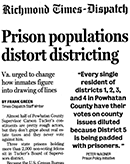Virginia has enacted legislation to end prison gerrymandering. It is one of more than a dozen states that counted incarcerated people at home for redistricting purposes in the 2020 redistricting cycle.
Virginia - Campaign Archive
The U.S. Census Bureau counts incarcerated people where they are confined not where they are from. Using these counts to draw state and county legislative districts enhances the political clout of people who live near prisons at the expense of everyone else in the state or county.
Legislation
Legislation for state districts
On April 22, 2020 HB 1255 (Del. Price), and SB 717 (Sen. McClellan), ending prison gerrymandering in state and congressional districts, were enacted after the Senate and House both concurred in the Governor's April 8, 2020 recommendations.
Legislation for local governments
Until 2013, some county and city governments had no choice but to include phantom residents in their districts simply because the Census tabulated incarcerated people as if they were residents of the prison location. In 2013 all cities and counties were finally given a choice to stop prison gerrymandering their own districts:
- HB 1339, "Election districts & redistricting; locality permitted to exclude from census correctional facility," prefiled by Delegate R. Lee Ware, Jr., November 20, 2012, and signed into law by the Governor on March 18, 2013. This bill allows any county, city or town to exclude incarcerated populations from their redistricting data (under previous law, exclusion was allowed only if the incarcerated population exceeded 12 percent of the a district's ideal population). (For an overview of the evolution of the law, see Virginia ends mandatory prison gerrymandering.)
- HB 13 Redistricting local districts; local government may exclude prison populations from its calculation, prefiled by Delegate Riley E. Ingram, December 2, 2011, passed unanimously by both the House and Senate in February 2012, and signed into law by the Governor on March 23, 2012. (For our analysis, see Virginia bill would help counties avoid prison-based gerrymandering.)
- HB 2073 Redistricting local districts; local government may exclude from its calculations, introduced by Delegate Riley E. Ingram, January 12, 2011. it passed the House, 99-0 on February 8, 2011, but was passed over in the Senate.
Endorsers
- The Roanoke Times (editorial , January 5, 2012)
- Unanimous resolution of the Board of Supervisors of Prince George County, Virginia, calling on the state to amend the state law that requires the county to use prison populations when redistricting to detriment of county democracy, November 23, 2010
Testimony and Letters
- Testimony of the League of Women Voters of Virginia, Before the House Committee on Privileges and Elections, January 14, 2015.
- Testimony of Aleks Kajstura, Before the Senate Committee on Privileges and Elections, January 14, 2015.
- Testimony of Aleks Kajstura, Before the House Committee on Privileges and Elections, January 14, 2015.
- Letter from the League of Women Voters of Virginia to John Thompson, Director of the Census Bureau, February 17, 2014
- Testimony of Peter Wagner, Before the Senate Committee on Privileges and Elections, February 21, 2012.
More information
- Prison-based Gerrymandering in Virginia, by Karen Kimball, member of the League of Women Voters of Arlington, Virginia, November 2013
- Fixing prison-based gerrymandering after the 2010 Census: Virginia, March 2010
Press coverage
 Prisoners shouldn't pad electoral districts, Roanoke Times editorial, January 5, 2012
Prisoners shouldn't pad electoral districts, Roanoke Times editorial, January 5, 2012- Proposal would exclude prisoners for redistricting, by John Crane, Lynchburg News and Advance, December 28, 2011
 Legislature urged to change prisoners' role in districting, by Frank Green, Richmond Times-Dispatch, September 5, 2010
Legislature urged to change prisoners' role in districting, by Frank Green, Richmond Times-Dispatch, September 5, 2010- Culpeper supervisors begin redistricting work in county, by Donnie Johnston, Free Lance-Star (Fredericksburg), February 16, 2011
- Supervisors name redistricting panel, by Michael Copley, Powhatan Today, February 23, 2011
- Taking a closer look at the redistricting process, by Carson Tucker (Powhatan County Supervisor, District 5), Powhatan Today, February 23, 2011
 Legislature urged to change prisoners' role in districting
Legislature urged to change prisoners' role in districting


